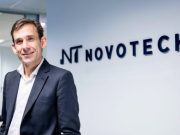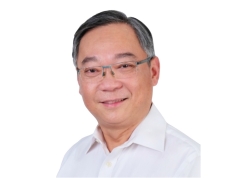FSSA Investment Managers Richard Jones Director: Why Sector Labels Don’t Tell the Full Story
Investment commentary on Sector Labels, Resilient Companies & High Quality Companies, by Richard Jones, Director of FSSA Investment Managers:
FSSA Investment Managers (FSSA IM) is an autonomous team within First Sentier Investors. FSSA IM are bottom-up investors, using fundamental research and analysis to construct high-conviction portfolios, conducting more than a thousand direct company meetings a year, seeking to identify high quality companies that they can invest in for the long term. FSSA IM manages $37.2 billion globally (31/3/21).
1. Why sector labels don’t tell the full story

As many economies have started to bounce back from the worst of the pandemic, we are now back in more familiar territory – central banks, the rate of money-printing and inflation. Markets have sold off on the arrival, as opposed to just the expectation, of better times.
There has been a sizeable rotation in equity markets along with a sell-off in bonds. Bond-like equities, which benefited most from lower discount rates, have fallen. The most speculative, Covid-bolstered, technological and crowded end of the market has been hit the hardest.
Markets now seem reminiscent of where they were before the pandemic. The difference today is there is considerably more corporate debt, public finances have been traduced and market valuations are broadly higher. Policy-wise, there is likely to be a shift to more government intervention in markets, alongside higher taxation and greater regulation.
Against this backdrop, many investors are considering how to position their Asia Pacific portfolios for the post-pandemic world. In our view, the most important consideration is to remain focused on our investment philosophy, which is to seek high-quality companies to invest in for the long term.
2. Asia growth: Finding resilient companies even as economies rebound
Although we are bottom-up investors, we look to the powerful structural themes that support the underlying businesses we own, such as a growing middle class, rising consumption, an ageing population, better healthcare and technological disruption.
We believe Asia Pacific companies in the consumer staples sector – which includes food, beverages, household and personal products – and in consumer discretionary – such as cars, apparel, retailers – (as categorised by MSCI) are set to benefit most from these trends. However, these categories don’t tell the whole story. Investors need to look ‘under the bonnet’ of their portfolios to truly understand the themes that are driving returns, and to identify the sectors to which their portfolio holdings ‘look through’.
In our view, for example, Techtronic Industries, Shanghai International Airport (SIA) and Jardine Matheson are consumer-driven companies, even though MSCI classifies them as Industrials. Home Depot accounts for 50% of Techtronic’s sales, while Chinese tourism (both domestic and international) should give SIA a strong tailwind. Although Jardine Matheson is a conglomerate, its two largest businesses (Jardine Cycle & Carriage and Dairy Farm) are both consumer businesses. We would also consider Voltas, the Indian air conditioning manufacturer, to be another consumer business, although MSCI categorises it as an Industrial company.
Tech companies that manufacture and supply global multi-nationals with components and services (we own Taiwan Semiconductor (TSMC), Mediatek, Largan and Advantech) – are benefitting from the rise in smart technology and automation, while IT services companies – typically multi-national firms based in India – are, quite simply, digitising the world. The pandemic has given them multiple additional tailwinds, and they are collectively very high-quality companies, with high returns, strong cash flow and typically net cash balance sheets. We own Tata Consultancy Services (TCS), Tech Mahindra and Cognizant in this sector.
We also expect the leading Asian financial companies, particularly Indian private banks, to perform well over the longer term. They are often high return-on-equity compounding businesses with substantial growth potential, and we believe Covid has strengthened their competitive position.
3. High quality companies flourish through crises
Although past crises may have different causes – the global financial crisis and the Asian financial crisis were both caused by excessive debt, while the SARS and Covid crises were health-related – there was a similar knock-on effect on consumption and economic growth in each.
As markets oscillate between pessimism and euphoria, the best way to deal with an unpredictable future is to simply focus on buying high-quality companies. The best companies will prosper in easier times and suffer the least during adversity. We believe the most obvious markers of a quality company over the long term are a high return-on-equity (ROE), alongside a reasonable growth rate that’s achieved in a relatively foreseeable and sustainable fashion. Businesses in sectors such as consumer staples, rather than capital goods, are also much more predictable.
We think people (and management teams in particular) are the primary ingredient that makes great franchises and drives returns. Additionally, we have found that those companies which treat their staff well, pay their taxes, and behave properly do better – and are more sustainable – than those that don’t.
With a high-conviction mindset that’s focused on high-quality companies, top-down driven downdrafts tend not to result in a permanent loss of capital. The impact is usually more transient. High-quality businesses usually recover more quickly and may even gain competitive advantage in a more difficult environment.
When the market-tide goes out, as we have seen most recently with the Covid market response, it is much easier to avoid excessive pessimism if you own high-quality, reasonably-valued and well-capitalised businesses. The hardest part is the essential discipline to do nothing, other than to consider the bargains being offered by the market. It is clearly much easier to do this from a position of strength and resilience.
This is an investment commentary on Sector Labels, Resilient Companies & High Quality Companies, by Richard Jones, Director of FSSA Investment Managers (30/6/21).
Richard Jones is a Director of FSSA Investment Managers, part of First Sentier Investors. He joined FSSA Investment Managers in 2010 and is focused on Asia Pacific equities. He is also responsible for managing a number of Asia Pacific Leaders portfolios on behalf of key client segregated accounts.
Richard has more than 32 years of investment experience in Asia, focused on both company research and portfolio management. He graduated from the London School of Economics with a first class degree.
 About FSSA Investment Managers
About FSSA Investment Managers
FSSA Investment Managers (FSSA IM) is an autonomous team within First Sentier Investors with dedicated investment professionals in Hong Kong, Singapore, Tokyo and Edinburgh. FSSA IM are bottom-up investors, using fundamental research and analysis to construct high-conviction portfolios. They conduct more than a thousand direct company meetings a year, seeking to identify high quality companies that they can invest in for the long term. As responsible, long-term shareholders, FSSA IM have integrated ESG analysis into their investment process and engage extensively on environmental, labour and governance issues. As at 31 March 2021, FSSA IM manages US$37.2 billion on behalf of clients globally.
Disclaimer:
The information contained within this document is generic in nature and does not contain or constitute investment or investment product advice. The information has been obtained from sources that First Sentier Investors (“FSI”) believes to be reliable and accurate at the time of issue but no representation or warranty, expressed or implied, is made as to the fairness, accuracy, completeness or correctness of the information. Neither FSI, nor any of its associates, nor any director, officer or employee accepts any liability whatsoever for any loss arising directly or indirectly from any use of this document. Reference to specific securities (if any) is included for the purpose of illustration only and should not be construed as a recommendation to buy or sell the same. All securities mentioned herein may or may not form part of the holdings of First Sentier Investors’ portfolios at a certain point in time, and the holdings may change over time.
This document has been prepared for general information purpose. It does not purport to be comprehensive or to render special advice. The views expressed herein are the views of the writer at the time of issue and may change over time. This is not an offer document, and does not constitute an investment recommendation. No person should rely on the content and/or act on the basis of any matter contained in this document without obtaining specific professional advice. The information in this document may not be reproduced in whole or in part or circulated without the prior consent of FSI. This document shall only be used and/or received in accordance with the applicable laws in the relevant jurisdiction.
In Hong Kong, this document is issued by First Sentier Investors (Hong Kong) Limited and has not been reviewed by the Securities & Futures Commission in Hong Kong. In Singapore, this document is issued by First Sentier Investors (Singapore) whose company registration number is 196900420D. This advertisement or publication has not been reviewed by the Monetary Authority of Singapore. First Sentier Investors and FSSA Investment Managers are business names of First Sentier Investors (Hong Kong) Limited. First Sentier Investors (registration number 53236800B) and FSSA Investment Managers (registration number 53314080C) are business divisions of First Sentier Investors (Singapore). The FSSA Investment Managers logo is a trademark of the MUFG (as defined below) or an affiliate thereof.
First Sentier Investors (Hong Kong) Limited and First Sentier Investors (Singapore) are part of the investment management business of First Sentier Investors, which is ultimately owned by Mitsubishi UFJ Financial Group, Inc. (“MUFG”), a global financial group. First Sentier Investors includes a number of entities in different jurisdictions.
MUFG and its subsidiaries are not responsible for any statement or information contained in this document. Neither MUFG nor any of its subsidiaries guarantee the performance of any investment or entity referred to in this document or the repayment of capital. Any investments referred to are not deposits or other liabilities of MUFG or its subsidiaries, and are subject to investment risk, including loss of income and capital invested.
Sign Up / Register
Caproasia Users
- Manage $20 million to $3 billion of assets
- Invest $3 million to $300 million
- Advise institutions, billionaires, UHNWs & HNWs
Caproasia Platforms | 11,000 Investors & Advisors
- Caproasia.com
- Caproasia Access
- Caproasia Events
- The Financial Centre | Find Services
- Membership
- Family Office Circle
- Professional Investor Circle
- Investor Relations Network
Monthly Roundtable & Networking
Family Office Programs
The 2025 Investment Day
- March - Hong Kong
- March - Singapore
- July - Hong Kong
- July - Singapore
- Sept- Hong Kong
- Sept - Singapore
- Oct- Hong Kong
- Nov - Singapore
- Visit: The Investment Day | Register: Click here
Caproasia Summits
- The Institutional Investor Summit
- The Investment / Alternatives Summit
- The Private Wealth Summit
- The Family Office Summit
- The CEO & Entrepreneur Summit
- The Capital Markets Summit
- The ESG / Sustainable Investment Summit


































